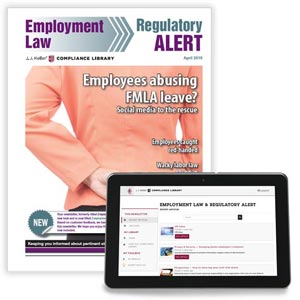Can an injured employee refuse your light-duty offer?
Accidents happen, despite your best efforts to provide a safe work environment and ensure that employees follow established safety rules. Most employee injuries are minor and require only first aid, but some injuries are more serious and prevent the employee from performing his or her job duties. The employee might require days or weeks off to recover, often referred to as workers’ compensation leave.
After a serious injury, the employee’s treating physician might release the employee to work, but with restrictions that prevent the employee from immediately returning to the former position. You are not required to offer light-duty work. Even if you have a light-duty program, you might not have suitable work available that meets the employee’s restrictions. Whenever possible, however, you should encourage injured employees to return to some type of light-duty work. This benefits both the employer and the employee.
The employer benefits because the employee is earning wages rather than collecting workers’ compensation payments. This reduces the cost of the injury claim, which helps keep insurance premiums under control. Employees benefit by maintaining a routine, keeping in contact with coworkers, staying connected to the job, and even healing more quickly by staying active.
Despite these benefits, some employees will refuse a light-duty offer, which raises the question: Can the employee actually refuse? The answer depends on whether the employee is eligible for leave under the Family and Medical Leave Act (FMLA). A workplace injury that requires time off may qualify as a serious health condition under the FMLA.
When the FMLA applies
An employee on FMLA leave could choose to stay home until he or she can return to the former position (or to an equivalent position), or until the available FMLA leave is exhausted. You cannot discipline or terminate an employee for refusing light-duty work when the absence is protected under the FMLA. This doesn’t mean, however, that the employee’s refusal is without consequences.
Workers’ compensation provides payments to injured employees who are unable to work, but will not continue paying an employee who could be working but simply chooses to stay home. The employee’s refusal to accept a light-duty offer will usually result in a loss of workers’ compensation payments. This does not affect the employee’s right to unpaid FMLA leave, but the prospect of staying home without pay (or having to use up available vacation hours) may encourage the employee to accept your offer.
When the FMLA does not apply
If the absence is not protected by the FMLA or the employee is not eligible for FMLA, the employee might still refuse a light-duty offer, which will again result in a loss of workers’ compensation payments. If the thought of unpaid leave fails to motivate the employee to accept light duty, you may require the employee to return to work.
Employees on workers’ compensation leave cannot be subjected to retaliation for filing an injury claim or collecting benefits, but they do not enjoy greater rights to continued employment than any other employee. This means they could be disciplined or terminated for legitimate reasons other than the injury claim, including a refusal to report for work when expected or required, even if the expectation is to perform light-duty work.
Although you could let the employee stay home, you do have the option to impose consequences such as discipline or termination for refusing to work. Typically, a refusal to report for work is considered job abandonment. You should discuss the potential consequences of refusal with the employee when making a light-duty offer.
This article was written by Ed Zalewski, editor, J. J. Keller & Associates, Inc.
 Our Employment Law Regulatory Alert newsletter offers current human resources news and HR hot topics in one convenient source.
Our Employment Law Regulatory Alert newsletter offers current human resources news and HR hot topics in one convenient source.


